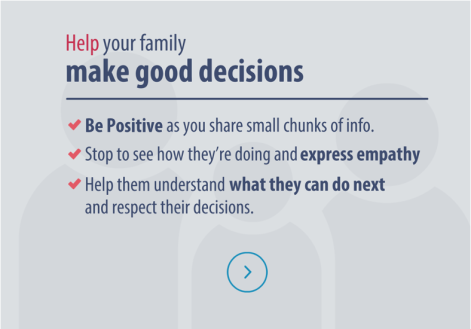Discussing Test Results with Relatives
Speaking with Relatives about Risk
By definition, hereditary cancers affect entire families. Inherited gene mutations can be passed from either parent to their children. Blood relatives, even distant ones, may share the same mutation that runs in a family. It is important to communicate with as many relatives as you can about cancer in the family.
This section covers the following topics:
Breaking the cycle of
Generation after generation, can take a huge toll on families. Breaking this cycle requires two important steps:
- genetic testing
- sharing test results with relatives
Each family member who is tested and shares their results plays an important role in protecting their loved ones from cancer. Experts call this cycle of testing-sharing-testing-sharing “cascade testing.”
Preparing to communicate
Planning ahead can help your communication process proceed more smoothly. This includes:
- identifying which relatives need to be contacted.
- assembling a list of important medical records (including genetic test results) and any relevant family health history.
- preparing a list of genetics experts and support resources.
- gathering factual information about known gene mutations in the family, associated cancer risks and risk management options.
- enlisting relatives to help you communicate with other relatives.
FORCE's brochure, The Genes Between Us is a step-by-step guide with resources for sharing genetic information with relatives.
Having the conversation
It is important to exchange medical information—especially genetic test results—with your relatives, so that every family member who may be at high risk for cancer can take steps to protect their health. Yet, sharing this information can be challenging because every person and family situation is different. For example:
- Some people prefer to keep medical information private.
- Family members may have differing personal beliefs about medicine and health.
- Some people prefer to avoid what they perceive as bad news.
- Some family members may be distant or estranged from one another.
- The ideal timing for sharing information may vary based in individual circumstances.
Tips for sharing
The following are some tips compiled by experts and community members to help you share genetic information with your relatives:
- Enlist other relatives. Some families have a member who collects genealogy or acts as the family historian.
- Ask your genetic counselor if you can share their contact information in case your relatives have questions or provide your relatives with the name of a genetic counselor in their area.
- Don't worry if you cannot tell your relatives in person. In a FORCE survey on family sharing, people who were informed of a mutation by text or Facebook were less likely to be satisfied than people who were told in person or by phone, letter, or email. Most respondents were grateful to their relatives for telling them about the mutation regardless of how they were told.
Our brochure, The Genes Between Us provides more details.
If you are hesitant to share
People have valid reasons for not sharing medical information with relatives, including:
- family estrangement
- concerns about a relative's possible reaction
- concerns about timing
It's important to remember that while there may be no perfect time to learn about the risk for cancer, there is also no convenient time to receive a diagnosis of cancer.


